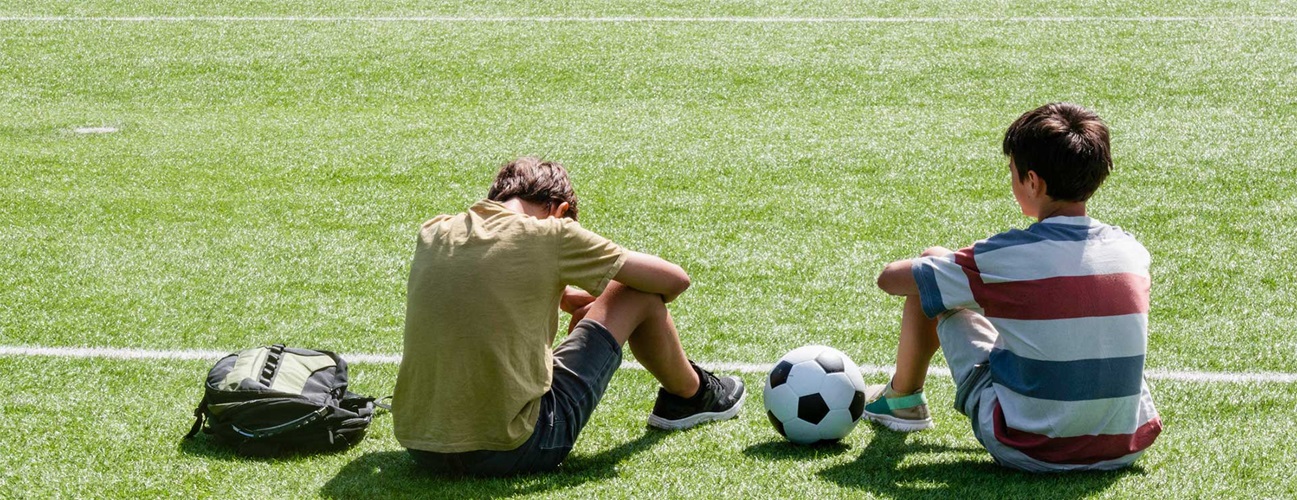Student Athlete Mental Health: Tips for Parents and Coaches
Featured Expert:
Participating in sports can provide children and teens with fitness, fun, confidence, companionship and great memories. But mental health problems can be part of the picture, too.
Valerie Valle, Psy.D., sports and performance psychologist in the Johns Hopkins All Children’s Hospital Institute for Brain Protection Sciences offers insights on student athlete mental health and how parents and coaches can support kids’ well-being.
Playing Sports: Benefits for Children and Teens
If your child or teen is interested in taking up sports lessons or trying out for a team, that’s good news, says Valle. She notes there are many benefits of youth sports participation, including increased physical activity and enhanced confidence in the person’s ability to achieve specific goals.
According to a study of adolescent health behaviors in the U.S., student athletes are more likely than their nonathlete peers to engage in health-promoting behaviors such as daily physical activity, sleeping at least seven hours a night, eating fruits and vegetables and drinking less soda. High-school student athletes also appear to be more competent in school and have higher expectations to continue education beyond high school compared with nonathletes. A third key finding is that student athletes report higher perceived self-esteem and are more confident in their ability to achieve specific goals compared with their nonathlete peers.
Negative Effects of Youth Sports on Mental Health
As fun and beneficial as sports can be for children and teens, there are some potential pitfalls. For young people with still-developing self-image and self-regulation skills, the strong emotions and internal and external pressures associated with playing sports can be difficult to cope with.
Increased physical activity often means increased risk of injury. This is particularly true for youth who specialize in a single sport before reaching puberty and engage in year-round training with insufficient periods of rest.
Exceptionally talented or skilled children and teens who have the chance to participate at the elite level at a young age need special attention. “This can be a very challenging period, when focusing on the right values for the student athlete is essential,” Valle says.
Young athletes can experience a variety of mental health problems tied to playing a sport, including:
Associating Winning with Self-Worth
A strong competitive instinct is the mark of a great athlete. But young athletes may take it particularly hard when a personal setback occurs. They may have an unrealistic standard for themselves and start to equate their athletic performance with self-worth.
Pressure to achieve specific goals can come from within the student athlete, from parents and guardians, and from coaches and sports organizers in equal measure, Valle says. When student athletes are given time to process the reasoning behind goals, they get more satisfaction from the effort they put in to achieve the goal, and they will be motivated to apply the same effort to future goals.
Unhealthy Perfectionism in Sports
Some children have a strong sense of perfectionism, and it does not always benefit them in sports. An athlete striving for unhealthy perfection may:
- Avoid taking risks and resist change for fear of failure
- Be overly sensitive to criticism
- Get frustrated over the smallest mistakes
- Procrastinate or give up on difficult tasks
- Downplay accomplishments or attribute them to luck instead of skill
“It is important to avoid rigid perfectionism. Focusing on very narrow, exacting standards or goals and treating them as nonnegotiable is risky. Something unforeseen, such as an injury, can mean taking time away from practice, for example, and a child or teen might stress out about getting behind,” Valle says.
Student Athlete Stress and Anxiety
Stress is the response of a person’s body and mind to challenge. It is the sense of not knowing if you have what it takes to master a situation that asks for a response or action. Stress is part of life and can be a byproduct of the excitement of sports and competition. But when there is too much stress, problems arise.
Young athletes can get stressed when they don’t make the team, make a mistake, don’t get the play time they want, or fall short of a metric they are working to achieve. Balancing sports participation with academics, hobbies, friends, family time and other social activities can also contribute to stress.
Even good stress can take a toll. A child or teen who is very excited about a big game, tryout or tournament can experience the effects of stress, even when it is in a positive context.
Valle says symptoms of being stressed out can include:
- Feeling on edge or overwhelmed OR “checked out” and apathetic
- Panic attacks
- Agitation
- Avoidance (skipping practice, for example)
- Voicing reluctance or dread about going to practice or competitions
- Difficulty sleeping or sleeping more than usual
- Stomach problems such as upset stomach, constipation or diarrhea
- Headaches
- Risk-taking behaviors such as problematic substance use
Sometimes, stress can fuel anxiety — the feeling of worry or fear. But anxiety can also develop on its own or linger after the cause of stress is removed. For example, young athletes may experience performance anxiety before a competition — a worry about a failure or mistake. Making a small mistake can reinforce this feeling and turn it into a looming fear of repeating the mistake. Parents and coaches who are focused on specific outcomes can intensify a fear of failing, heightening a young athlete’s anxiety.
It’s useful to note if the stress symptoms are happening in other situations such as school or social activities, which can be a sign the child or teen is dealing with an anxiety disorder.
Read more about anxiety and stress in teens.
Depression in Young Athletes
Depression can affect anyone, even high-performing young athletes. There are many factors at play, including genetics and personality, as well as the pressures of youth sports, especially for elite athletes.
Depression in children can look like boredom, distractedness or low energy. A few days of the blahs or sadness is nothing to worry about. But if your child loses interest in their sport or other things they normally enjoy, stay alert. These signs, along with others such as a weekslong sad mood, change in appetite or sleep patterns and other symptoms warrant a trip to the doctor to rule out depression.
Burnout in Youth Sports
Parents can be very enthusiastic when their child shows an interest or aptitude in sports ― especially if they demonstrate unusual talent. But sometimes encouragement can become pressure. After concentrating on one sport for a while, young athletes may become tired of it, both emotionally and physically. Emotional and physical exhaustion, reduced sense of accomplishment and a feeling of declining value in the sport are all characteristics of burnout, according to researchers.
Burnout can affect children and teens in many ways. Signs of burnout in young athletes can include:
- Going to practice without the usual enthusiasm
- Choosing to spend more time away from the sport
- Feeling overly defeated and discouraged after losses or setbacks
- Appearing fatigued or disinterested
- Expressing desire to quit the sport
What Parents and Coaches Can Do
Negative effects of youth sport participation like injury, performance anxiety and burnout do not discriminate based on the type of sport. Athletes involved in individual and team sports can be affected. But there are things athletes, parents, coaches and mentors can do to help build resilience and keep fun in sports.
Open a Dialogue and Listen
If you suspect something is taking a toll on your child or teen’s mental health, acknowledge any signs of anxiety or burnout. Ask open-ended questions about your observations and listen with the desire to understand, Valle says.
“‘I’ve noticed that …’ is a great place for parents to start,” she says. For instance, saying, “I have noticed that you don’t seem to be having as much fun at soccer practice in the last couple of weeks” gives the child or teen an opening to gradually explore any stressors or events that have affected them.
Evaluate the Extent of the Problem
One of the goals is to determine whether the athlete does not want to face a specific one-time situation or if it is a case of an ongoing stress, burnout, anxiety or depression.
“For a child or teen with a persistent pattern of mental health symptoms lasting two to four weeks, it may be time to consult a mental health professional. For teens, it helps to ask them if they want to talk to someone,” Valle suggests.
Set Meaningful and Achievable Goals
Parents, guardians and coaches can help young athletes build resilience by establishing an emotional foundation — a “why.” It is an internalized framework of strong values that prepares the athlete to face challenges, keeps them centered and helps sustain the athlete through the ups and downs.
The “why” should be more about learning and growing and finding meaning ― and less about winning or avoiding failure ― so the sport continues to be rewarding for the long term.
Parents, coaches and mentors can also help young athletes understand that events related to competition in most cases do not have permanent life-altering consequences. Whether it is a thrilling victory or an agonizing defeat, most athletes learn, “This, too, shall pass.”
Make Time for Breaks
Valle notes that parents and guardians can work with coaches to give kids appropriate breaks from training. Rest is equally necessary for building physical and psychological adaptation to stress. For elite athletes, building in rest and recovery breaks throughout the competitive season helps create a framework for the rest of their athletic career.
Keep Sports Fun
And, Valle says, it is important to keep sports fun. During childhood and teen years, natural talents emerge, and the ones that are genuinely enjoyable can become lifelong passions.
“Fun should definitely be part of the narrative,” she emphasizes. Developing attitudes of passion, curiosity and courage in sport participation are equally as important as developing speed, strength and technical skills.
Together, adults can help ground children and teens in a better “why”: the joy and values and learning. These are all good reasons for being involved in activities that can be hard on the body and the emotions.







.jpg?h=217&iar=0&mh=260&mw=380&w=380&hash=443521B0251BB1EDCFC5D3FDF4DA39C0)